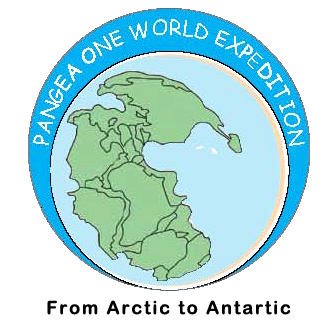
EXPEDITION ACCOUNTS
CENTRAL AMERICA: AN OBSTACLE COURSE
Leaving the ruins of Tikal and the squabbling Scarlet Macaw couple residing on a tree opposite our room, we left for Guatemala City driving through verdant hills resplendent with wild forests and meadows and tropical fruits. The bus had seen better days. While changing gears the driver would succeed once out of every eight or ten tries. The bus and the driver seemed to have declared war on each other. Every few kilometres the engine ceased and the driver, armed with spanners, marched to the rear, hammered and banged the machinery, and came back greased, soiled and bruised. His victories were brief. After covering some distance, the bus was ready to renew the fight. The bus groaned its way though the crooked road and half way to its destination it had a flat tyre. Though the road had an over-supply of puncture repairers only the sixth workshop we called on agreed to tackle our bellicose bus. The six-hour journey stretched to ten hours - and all of them a feast to the eyes.
Guatemala City has nothing much to offer except grand views of the Agua, Fuego and Acatenango volcanoes. But there is plenty that holds interest in its surrounds. Forty-five minutes away is Antigua, the old capital, flattened thrice by earthquakes yet flourishing with Spanish baroque architecture, some still fresh and others picturesque ruins. Our guide Celso Gomez's exhaustive knowledge drained us out and the rest of our energy was sapped by the strong sun and pushy Mayan ladies pedalling trinkets. Antigua was celebrating they day of St. Francis of Assisi, the patron saint of environment - the subject of our expedition. We joined the Mayans in lighting candles in St. Joseph Cathedral, a Roman Catholic church - and then followed them to the basement of the quake-devastated old cathedral where they perform their original mumbo-jumbo - without troubling anybody or finding defects in other religions.
Next day we drove to the volcano-fringed Lake Atitlan, three hours away from Guatemala City. The lake is volcanic in origin, filling an enormous caldera formed in an eruption 84,000 years ago. Author Aldous Huxley wrote of it: "Lake Como, it seems to me, touches on the limit of permissibly picturesque, but Atitlan is Como with additional embellishments of several immense volcanoes. It is really too much of a good thing." Huxley was known to use psychedelic drugs. I would dilute his observation a bit. Nevertheless, the villages around the lake are full of rustic old world charm. The public places, the markets and churches of Solola and Panajachel present a continuous enchanting procession of brilliant Cachiuel Mayan men and women attired in their traditional clothes hand-weaved and embroidered in a frenzy of colours. Street-side vendors slap dough into flattened round tortillas - just like the Indian chappati. Others, sitting in the pavement, are selling avocados, radish, cactus, banana leaves, machetes, embroidered clothes, pirated film and music CDs. As in India, the Mayan lady's blouse doubles as a purse that stores bank notes, handkerchief, keys and the mobile phone. Their all-purpose 'kapperraj' is the equivalent of our gammcha.
Hector, our vintage driver, had a 103-year-old father and a 96-year-old mother living in the village and still working on their small family farm. He had observed that the seasons had shifted somewhat after the 2004 earthquake that caused the tsunami that swept across the Indian Ocean and moved the earth's axis. The 2011 quake-tsunami combo that hit Japan might have wobbled the axis a bit more. This, according to Hector, was causing seasons to shift a wee bit. "You call it climate change. It is just seasons shifting a little," he said.
Whatever the cause, Gautamela, straddling three tectonic plates and two oceans, will be most vulnerable to climate change - whose effects are already visible: rainy season starts later, ends early and the concentrated, heavy downpour during the shortened season causes land,slides and flooding. This January there was an unusual snowfall in the mountains of Ixchiguan. The government has set up a Climate Change Unit to meet the challenge. Universities are offering courses in climate change. Varieties of flood-resistant maize and drought-resistant beans and other genetically modified crops that can tolerate extreme weather have already been developed.
From Guatemala City to San Salvador, the capital of El Salvador, it was a scenic drive through forested hills. The aristocratic Tica bus driver stepped on the accelerator, never slowed down on sharp turns, overtook extended container trucks at full speed, almost brushing against them. He missed, by a whisker, running over pavements, pedestrians, Bajaj tuk-tuks carrying school children, and a van transporting fresh fish. A couple of times, while driving, he took out his office bag and started doing administrative work: filing documents, checking statements, placing sheets on clipboard. Finally, in the outskirts of San Salvador, just after the army cantonment, he was flagged down by a well-drilled policeman and, in spite of his pleas, given a ticket for either talking on his mobile or speeding or both. From my front seat it was a hair-raising ride.
San Salvador is a shabby city with cracked, potholed roads, choked drains, and garbage everywhere. Houses were in a state of disrepair and the place had a poverty-stricken look. We spent an hour wandering around the town's historic centre and there was nothing pleasant in its sights, sounds and smells. The streets were populous with badly dressed shopkeepers who should be looking bored with life - but don't. They holler, shout and yell without any moderation of noise and take you by your hand and pull you to their wares. The square in front of the church is immaculately untidy. There is a compressed statue of some military guy sitting on a horse with a dull expression. It was being given a sound coating of guano by disrespectful pigeons. The receptionist at our budget hotel had asked us not to hang around too long and return before dark. We trudged back with our camera bags, looking back over our shoulders every now and then.
"El Salvador is a poor country," the receptionist had told me. "When a man dies here, his children inherit only debt and manure."





